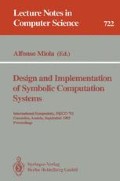Abstract
This paper proposes an analogical type system based on ITT. Based on the intuitive meaning of analogy, a set of rules are introduced and justified to deal with analogy. Analogies on types as well as terms are introduced in our system. By an analogy between types, we mean a pair of mappings satisfying coherent conditions on those types. Terms with analogous types are analogical if their focus points meet with each other under the analogy of the types. Analogical theorem proving and term derivation methods are also illustrated as examples of applications of our system.
This project is partially supported by National Science Fundations of China.
Preview
Unable to display preview. Download preview PDF.
References
Roland C. Backhouse, Paul Chisholm. Grant Malcolm and Erik Saaman, Doit-your-self type theory, Formal aspects of Computing, No 1, pp. 19–84, 1989.
J. Carbonell, Derivational Analogy: A Theory of Reconstructive Problem Solving and Expertise Acquisition, in R. S. Michalski et al(ed.), Machine Intelligence: An Artificial Intelligence Approach, Morgan Kaufmann, 1986.
Dershowitz, N., Programming by Analogy, in: R. S. Michalski, J. G. Carbonell and T. M. Mitchell (Eds), Machine Learning II: An Artificial Intelligence Approach, Morgan Kaufmann, Los Altos, CA, 1986, pp. 395–423.
Dietzen, S. R. and W. L. Scherlis, Analogy in Program Development, in: The Role of Language in Problem Solving 2, J. C. Boudreaux, B. W. Hamill, and R. Jernigan(Eds), North-Holland, 1987, pp. 95–115.
W. A. Howard, The formulae-as-types notion of construction, in ‘To H. B. Curry: essay on conbinatory logic, λ-calculus and formalism', ed. Hindely J. R. and Selidin J. P., Academic Press, New York, 1980.
George Polya, Induction and Analogy, Princeton Hall, 1957
Masateru, Harao, Analogical Reasoning for Natural Deduction Theorem Proving, in (Edited by Zhongzhi Shi) Automated Reasoning, IWAR 92 (Beijing' China) pp. 220–228
Jianguo, Lu, Analogical Program Derivation Based on Type Theory, To appear in Theoretical Computer Science Vol.113.
Per Martin-Lof, Constructive Mathematics and Computer Programming, in Logic, Methodology and Philosophy of Science, pp. 153–175, North Holland, 1982.
Bengt Nordstrom, Kent Petersson and Jan M. Smith, Programming in Mation-lof's Type Theory, Clarendon Press (Oxford) 1990.
Takeuti, G. Proof Theory, North-Holland, (2nd. edition), 1987.
Bo, Yi and Jiafu, Xu, A Survey on Analogy Reasoning, Computer Science (in Chinese), 1989, No. 4, pp. 1–8
Bo, Yi, Analogy Model and Analogy Correspondence:A Formal Theory on Analogy, Doctorial Thesis of Nanjing University, December 1989.
Bo, Yi and Jiafu, Xu, Analogy Calculus, To appear in Theoretical Computer Science vol. 113, May 1993.
Author information
Authors and Affiliations
Editor information
Rights and permissions
Copyright information
© 1993 Springer-Verlag Berlin Heidelberg
About this paper
Cite this paper
Yi, B., Xu, J. (1993). Analogical type theory. In: Miola, A. (eds) Design and Implementation of Symbolic Computation Systems. DISCO 1993. Lecture Notes in Computer Science, vol 722. Springer, Berlin, Heidelberg. https://doi.org/10.1007/BFb0013166
Download citation
DOI: https://doi.org/10.1007/BFb0013166
Published:
Publisher Name: Springer, Berlin, Heidelberg
Print ISBN: 978-3-540-57235-0
Online ISBN: 978-3-540-47985-7
eBook Packages: Springer Book Archive

